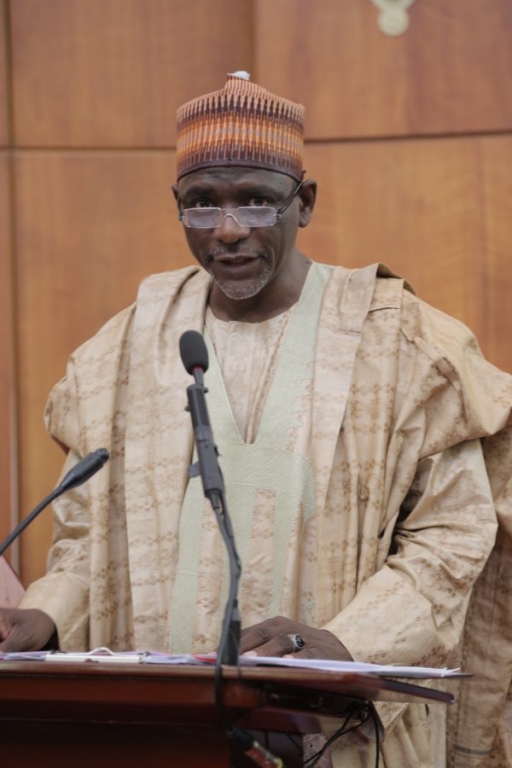The picture igniting as well as illustrating this story is that of General Theophilus Yakubu Danjuma arriving Makurdi, the Benue State capital into the welcoming hands of Governor Samuel Ortom earlier in the month of May this year. General Danjuma was on his way to the centenary of Government College, Katsina Ala. The school was the third of such schools to be established in northern Nigeria and the 12th in the entire country, meaning it preceded Barewa College, Zaria, for example, by over a decade. That was in 1914. It was thus one of the finishing schools across the region in those days. Calling it a finishing school is meant to convey that it prepared its products or groomed them to be the leaders in society as thinkers, as permanent promoters of merit and as those who would do great things, not masters of mean intrigues.
It was from those schools across Bauchi, Bida, Ilorin, Maidurguri and the other provinces that the British knitted the regional power elite that John Paden called a cohort in his book on Ahmadu Bello. As Reuben Ziri, the ground breaking Historian would say, this cohort was northern in name but national in orientation because the first set of propagandists who went out to speak for one Nigeria in the wake of the Nigerian Civil War, for instance, were not northerners in territorial terms. This is a complex argument by the ordinary standard of reasoning that it cannot be pursued in this write up. Suffice it to say that Ziri’s position is also Balarabe Musa’s and Balarabe Musa is a witness of truth. Empirically, it is also illustrated by someone like Haroun Adamu. Some people swear he is from Benue, others can bet any amount on his Bauchi origin but the man himself settled down in the evening of his life in Zaria.
A product of Government College, Katsina Ala in its hey days speaks of a place so beautiful it could motivate even the dullest lad towards being a genius. The teachers came from all over the world – Americans, Britons, Germans, New Zealanders, Pakistan, etc, etc. The quietism around the entire place was a deal. And, wait for it: the students were given toilet tissue, Omo and pocket money.

Dr Haroun Adamu

Mallam Adamu Adamu Education Minister
This contradictory dimension of British colonialism was sustained as long as the British held sway in Nigeria. Even when the British left, the system was maintained by the northern regional government. Trouble started later. When it did, the downward spiral was profound. As at May 2016 when the centenary held, the state of the school is better imagined than mentioned. It is worse than a shadow of itself. Hence, the lamentation galore, from Governor Darius Ishaku of Taraba State to Dr Haroun Adamu to T Y Danjuma as well as Isa Mustapha Agwai 1, the Emir of Lafia, all old boys of the school.
But the story of Government College, Katsina Ala is also the story of the entire educational system in Nigeria – the story of unmitigated crash from a height that was comparatively Olympian and about which something should be done beyond lamentation. People in the category of General Danjuma, no matter how congested their schedules are, are still those to saddle with the task of rejuvenation. And this is for five reasons. He is one of the few conscious ones who experienced a model of what our secondary schools should be like. He derided Lateef Jakande’s idea of what schools should be like, he has the uncommon clout to get the players in the system to move the reconstitution of the educational system into a national emergency, as a philanthropist, he is already playing a role in that direction and he is above pilfering public resources that may be entrusted to him.
In other words, he is still the one to be charged with the task of chairing a committee of, say, five or so members of that generation on how Nigeria may connect the past to the present as far as renewal in the educational system in the shortest possible time is concerned. Patriotism disallows us from writing certain things but everyone knows that the educational system in Nigeria now is a non starter in too many regards, a charade in need of a comprehensive reconstitution superintended by a very, very serious committee at the instance of the Federal Government as a national security task. If not Danjuma, who else? If not now, then when?
The first task is to determine the modalities before we start hanging the problem on ‘no money’ or fall in oil price. After this, the General would have effectively handed a sustainable future to the next generation. And he can then be allowed to retire finally, finally. Hence, the title of this piece: ‘The Last Duty’ for General Danjuma”
Of course, this is a bit untidy a suggestion. It has to appeal first to the Federal Government of Nigeria. If it doesn’t and there are many reasons it might not, then the General cannot begin to entertain any troubled conscience about the reality in question.




























